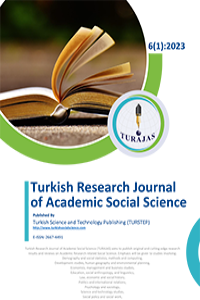Abstract
İnsanın kendi kendine hayatını sürdürememesi, diğer insanlarla birlikte yaşamasını gerektirmiştir. Bu durum yönetim kurumunu kaçınılmaz kılmıştır. “Nasıl bir yönetimle idare edilmeliyiz?” arayışı tarihi süreç içinde çok farklı yönetim sistemlerini ortaya çıkarmıştır. Sözü edilen sistemlerden biri de Hz. Peygamber’in Medine’de kurduğu devlette uyguladığı istişâreye dayalı yönetim uygulamasıdır. Bu çalışmada bu sistemi bir bütün olarak ele alma yerine sadece istişâre ayağı ve uygulama örnekleri analiz edilmiştir. Bu çerçevede önce istişâre kavramı ayrıntılı olarak ele alınmış, akabinde de bu mekanizmanın Hz. Peygamber’in yönetimindeki yeri örnekler üzerinden değerlendirilmiştir. İstişâre konusu değerlendirilirken özellikle lügatlerde nasıl ele alındığı belirlendiği gibi aynı zamanda yönetimdeki yeri belirlenmeye çalışılmıştır. İstişâre mekanizmasının Hz. Peygamber’in yönetimindeki yeri ele alınırken de konuyla ilgili örnekler analiz edilerek bu mekanizmanın yönetim kurumuna sağladığı katkı ortaya konulmuştur. Bu çerçevede istişâre mekanizmasının, her düzeydeki yöneticiler için vazgeçilemez bir çözüm üretme aracı olduğu sonucuna varılmıştır.
Keywords
References
- Âlûsî, Ş. (1415). Rûḥu’l-meʿânî fî tefsîri’l-Ḳurʾâni’l-ʿaẓîm ve’s-sebʿi’l-mes̱ânî, Dâru’l-Kutubu’l-İlmiyye, Beyrut.
- Âsım Efendi. (1305). Kâmus Tercümesi, İstanbul.
- Babilli, M. (1972). İslam’da Şûrâ, İstanbul.
- Belâzürî, E. (1996). Ensâbu’l-Eşrâf, Dâru’l-Fikr, Beyrut.
- Buhârî, E. (2001). el-Câmiʿu’ṣ-ṣaḥîḥ, Dâru Tavki’n-Necât.
- Ezherî, E. (ts.). Tehzîbu’l-Luğa.
- Fîruzâbâdî, E. (2005). el-Kâmûsu’l-Muhît, 8. basım), Müessesetü’r-Risale, Beyrut.
- Hamidullah, M. (1991). İslam Peygamberi, İrfan Yayımcılık ve Ticaret, İstanbul.
- İbn Ebû Hatim, M. (1419). Tefsîrü’l-Ḳurʾâni’l-ʿaẓîm, 3. Baskı, Mektebetü Nizar, Suudi Arabistan.
- İbn Hişâm, M. (1992). es-Sîretü’n-Nebeviyye, Dâru’l-Fikr, Beyrut.
- İbn Manzûr, F. (1414). Lisânu’l-Arab, 3. basım, Dâru Sâdır, Beyrut.
- İbn Sa’d, A. (1968). et-Tabakâtu’l-Kübrâ, Dâru Sadr, Beyrut.
- İbnü’l-Arabî, B. (2003). Aḥkâmü’l-Ḳurʾân, Daru’l-Kütübü’l-İlmiyye, Beyrut.
- Kurt, E. (2000). Hz. Peygamber Devrinde Danışma Meclisi (Şura). (Yayınlanmamış Yüksek Lisans Tezi), Sosyal Bilimler Enstitüsü/Dokuz Eylül Üniversitesi
- Kurtubî, E. (1964). el-Câmiʿ li-aḥkâmi’l-Ḳurʾân, Daru’l-Kütübü’l-Mısriyye, Kahire.
- Müftüoğlu, Ö. (2012). Bugünün Müslümanının Kur’an’la İletişimi, Ankara.
- Müslim, H. (ts.). el-Câmiʿu’ṣ-ṣaḥîḥ, Dâru İhyai‟t-Turâsi‟l-Arabî, Beyrut.
- Sayı, A. (1994). Kur’an Etrafında Makaleler, Anadolu Dağıtım, İzmir.
- Vâkıdî, A. (1989). Kitabü’l-Meğâzî, Dâru’l-A’lemî, 3.Baskı, Beyrut.
- Zebîdî, F. (1973). Tâcu’l-Arûs min Cevâhiri’l-Kâmûs, Dâru’l-Hidaye, Kuveyt.
Abstract
The inability of man to live his life by himself necessitated living with other people. This situation made the management institution inevitable. “How should we be governed?” search has revealed many different management systems in the historical process. One of the systems mentioned is the consultation-based administration practice that the Prophet implemented in the state he established in Medina. In this study, instead of considering this system as a whole, only consultation and application examples were analyzed. In this context, first the concept of consultation was discussed in detail, and then the place of this mechanism in the administration of the Prophet was evaluated through examples. In this study, while evaluating the subject of consultation, especially how it is handled in the dictionaries is determined, as well as its place in the administration. While discussing the place of the consultation mechanism in the administration of the Prophet, examples related to the subject were analyzed and the contribution of this mechanism to the administrative institution was revealed. In this framework, it has been concluded that the consultation mechanism is an indispensable tool for producing solutions for managers at all levels.
Keywords
References
- Âlûsî, Ş. (1415). Rûḥu’l-meʿânî fî tefsîri’l-Ḳurʾâni’l-ʿaẓîm ve’s-sebʿi’l-mes̱ânî, Dâru’l-Kutubu’l-İlmiyye, Beyrut.
- Âsım Efendi. (1305). Kâmus Tercümesi, İstanbul.
- Babilli, M. (1972). İslam’da Şûrâ, İstanbul.
- Belâzürî, E. (1996). Ensâbu’l-Eşrâf, Dâru’l-Fikr, Beyrut.
- Buhârî, E. (2001). el-Câmiʿu’ṣ-ṣaḥîḥ, Dâru Tavki’n-Necât.
- Ezherî, E. (ts.). Tehzîbu’l-Luğa.
- Fîruzâbâdî, E. (2005). el-Kâmûsu’l-Muhît, 8. basım), Müessesetü’r-Risale, Beyrut.
- Hamidullah, M. (1991). İslam Peygamberi, İrfan Yayımcılık ve Ticaret, İstanbul.
- İbn Ebû Hatim, M. (1419). Tefsîrü’l-Ḳurʾâni’l-ʿaẓîm, 3. Baskı, Mektebetü Nizar, Suudi Arabistan.
- İbn Hişâm, M. (1992). es-Sîretü’n-Nebeviyye, Dâru’l-Fikr, Beyrut.
- İbn Manzûr, F. (1414). Lisânu’l-Arab, 3. basım, Dâru Sâdır, Beyrut.
- İbn Sa’d, A. (1968). et-Tabakâtu’l-Kübrâ, Dâru Sadr, Beyrut.
- İbnü’l-Arabî, B. (2003). Aḥkâmü’l-Ḳurʾân, Daru’l-Kütübü’l-İlmiyye, Beyrut.
- Kurt, E. (2000). Hz. Peygamber Devrinde Danışma Meclisi (Şura). (Yayınlanmamış Yüksek Lisans Tezi), Sosyal Bilimler Enstitüsü/Dokuz Eylül Üniversitesi
- Kurtubî, E. (1964). el-Câmiʿ li-aḥkâmi’l-Ḳurʾân, Daru’l-Kütübü’l-Mısriyye, Kahire.
- Müftüoğlu, Ö. (2012). Bugünün Müslümanının Kur’an’la İletişimi, Ankara.
- Müslim, H. (ts.). el-Câmiʿu’ṣ-ṣaḥîḥ, Dâru İhyai‟t-Turâsi‟l-Arabî, Beyrut.
- Sayı, A. (1994). Kur’an Etrafında Makaleler, Anadolu Dağıtım, İzmir.
- Vâkıdî, A. (1989). Kitabü’l-Meğâzî, Dâru’l-A’lemî, 3.Baskı, Beyrut.
- Zebîdî, F. (1973). Tâcu’l-Arûs min Cevâhiri’l-Kâmûs, Dâru’l-Hidaye, Kuveyt.
Details
| Primary Language | Turkish |
|---|---|
| Subjects | Religious Studies |
| Journal Section | Research Article |
| Authors | |
| Early Pub Date | July 20, 2023 |
| Publication Date | July 26, 2023 |
| Submission Date | April 28, 2023 |
| Published in Issue | Year 2023 Volume: 6 Issue: 1 |
ISSN: 2667-4491
Dear Authors,
According to the February 25, 2020 dated ULAKBIM decision, all kinds of researches conducted with qualitative or quantitative approaches that require data collection from participants using survey, interview, focus group study, observation, experiment, interview techniques, and the use of humans and animals (including materials/data) for experimental or other scientific purposes require an Ethics Committee certificate.
The ethics committee approvals obtained in accordance with the “publication policy” of the articles submitted to the Turkish Academic Social Sciences Research Journal must be specified in the METHOD section of the article and uploaded to the system. Publications with plagiarism report over 20% and studies without ethics committee approval will not be evaluated for publication in our journal.
Thank you for your attention and understanding.
This work is licensed under Creative Commons Attribution-NonCommercial 4.0 International License

